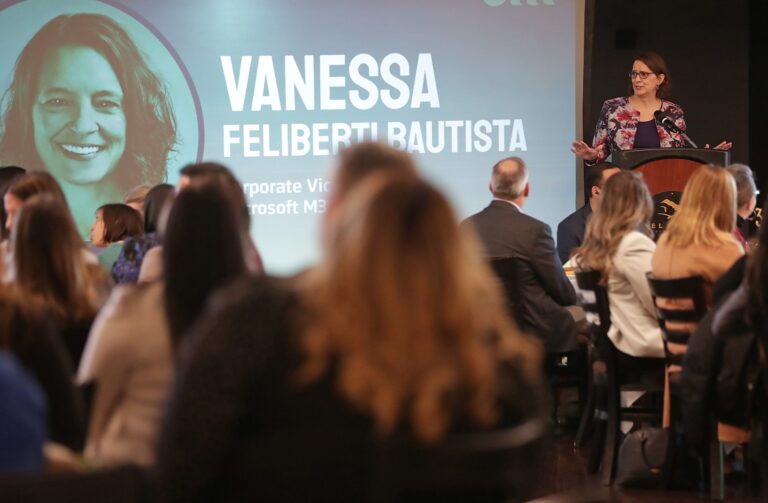“Why not us?” asked Vanessa Feliberti Bautista, challenging El Paso and the border region to become technology leaders in the age of artificial intelligence.
Bautista, an El Paso native and vice president of Microsoft 365 programs, was the keynote speaker at the second annual Change Makers Luncheon held at the El Paso Country Club on Wednesday. The event celebrates the achievements of women in the borderlands as part of Women's History Month, and this year recognized women in technology.
Change Makers is a collaboration between El Paso Matters, a nonprofit online news organization, and Progress321, a nonprofit network of local experts.
Bautista was one of 20 women honored this year, along with Kathy Chen Arriaga, Executive Director of Fab Lab El Paso. Anne Quiroz Gates, Senior Advisor to the Chancellor for Strategic STEM Initiatives at the University of Texas at El Paso. and Nancy Lowery, senior director of innovation at America Foundation Medical Center.

“The world around us is changing rapidly,” Bautista said. “We have a tremendous opportunity to not only adapt, but lead in the AI era across all aspects of the economy.”
She also cited aerospace as an area where El Paso could make significant technological advances.
“Just by looking around you can see the impact of what's happening locally,” Bautista said. “Nearly 20% of all U.S.-Mexico trade is connected to the region. Similarly, the aerospace industry is experiencing significant investment and growth, driven by our collaboration with UTEP and Fort Bliss, and our The region has become a prime destination for aerospace companies seeking growth.”
Bautista studied at the Massachusetts Institute of Technology, earning a bachelor's degree in computer science and engineering in 1991. She attended Boston University, where she graduated with her master's degree in software engineering in 1993. She joined Microsoft right after graduating from graduate school.
Optimism drives Bautista's efforts in many aspects of his career. Among them, she said, is the rise of artificial intelligence, its potential contribution to the technology industry, and its use as a tool to solve some of humanity's greatest challenges.
She said she is “very excited” about the age of AI and the power of the ChatGPT natural language model, among other technological advancements.
“We're going to find a cure for cancer. We're going to find a cure for Alzheimer's disease. We're going to find a cure for climate change. I'm absolutely committed to that. It's positive because where the excitement is and based on the foundation we've built, it's a great time to be in the tech industry.”
Mr. Bautista, who helped develop a multi-million dollar email service used in countless industries around the world, is an El Pasoan and 1987 graduate of Eastwood High School. She has been with Microsoft since 1993 and has held several leadership positions in software engineering throughout her 31-year career.
“When I first started, my team was 8% female, and now it's 29% female,” Bautista said. “It's been incredible growth. When I started, there were only 30 female engineers in executive positions. Today, that number is over 200. There's momentum and we're seeing growth. I think the work we've done to demonstrate the potential of investment and technology is for everyone.”
Bautista has seen the growth within Microsoft firsthand and is optimistic that this number will continue to rise thanks to investments in STEM by tech giants like Microsoft.
As well as promoting the empowerment of women in STEM fields, recent efforts aim to diversify these fields in other demographic areas as well. Bautista highlighted some of those efforts.
In September 2023, UTEP, whose student body is 84% Hispanic, announced a new project in September 2023 to evaluate and identify how NSF HSI-funded programs benefit Hispanic and other minority students in STEM fields. announced that it has won a $7 million grant from the National Science Foundation.
With employment rates for young women and Latinas in STEM fields gradually increasing, the future looks brighter than ever.

Bautista concluded his speech by encouraging the audience to ask themselves some important questions about the future of technology.
“How can we harness the power of AI to reimagine robotics, manufacturing, and cybersecurity? How can we harness the power of natural language models to reimagine how we approach accessible and equitable education?” “Can we do it?” she asked. “How can AI and data analytics optimize supply chain management of cross-border trade, improve efficiency and reduce environmental impact?”
Bautista said there are many opportunities ahead where these questions need to be asked.
“For me, these are not impossible questions,” Bautista said. “In fact, these are the questions that drive those who make change. And given the spirit of this community, I truly believe that the future is forged by us. So I ask you: , “Why not us?” We are change-makers. ”
Disclosure: Microsoft is a financial supporter of El Paso Matters. Financial supporters play no role in El Paso Matters' journalism. View the news organization's policy on editorial independence. here.





























